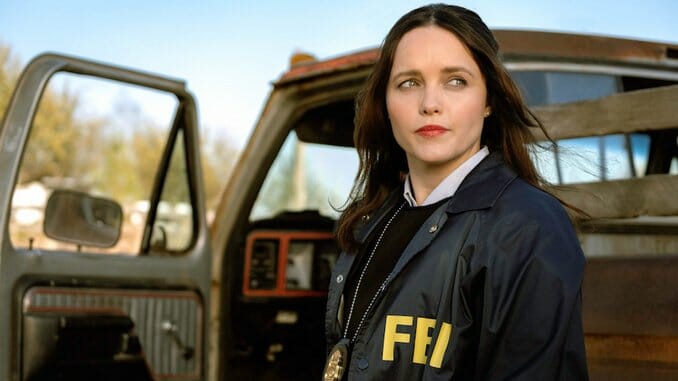Clarice: CBS’s Silence of the Lambs Sequel Series Tries to Overcome a Trite Format that Clips Her Wings
Photo Courtesy of CBS TV Reviews Clarice
Over the span of four novels, five film adaptations, and one TV series, Thomas Harris’ Hannibal Lecter character has evolved into a modern-day horror superstar. The fiercely smart, psychologist-turned-cannibal serial killer’s outsized presence has had a tendency to devour the memorable characters around him. Even Harris’ FBI agent Clarice Starling, who rumbled with the good doctor most dramatically in both the book and film versions of The Silence of the Lambs, has since drifted into the ether.
Looking to refocus the audience’s gaze back on Starling and give the brilliant young profiler her time in the sun, executive producer Jenny Lumet created Clarice for CBS. Together with current Trek-verse architect Alex Kurtzman, they’ve crafted a series that places Starling front-and-center in a Lecter-less narrative. It’s one year after Starling cracked the “Buffalo Bill” serial killer case central to Lambs and she’s still suffering some acute PTSD from the fallout of that case.
In the series, it’s Jodie Foster’s Oscar-winning portrayal of Starling that looms large as actress Rebecca Breeds (Pretty Little Liars) assumes her look and more importantly the distinctive Appalachian accent that helped distinctly define the character in the film. Instead of being a twangy misstep, Breeds (an Australian) makes the accent the bridge between portrayals. It gives the audience a familiar tether to the film, which is a helpful shorthand to the myriad of problems Starling is still struggling with from her first-ever case.
Now a full-fledged agent, Starling is by choice working in a basement with the behavioral sciences division, far away from the limelight that came with catching Bill. However, when Attorney General Ruth Martin (Jayne Atkinson) creates the VICAP Task Force to investigate serial killer cases, she recruits Starling to be its newest member. It’s not exactly a selfless act, considering that Martin is also the mother of Catherine (Marnee Carpenter), the lone survivor of Bill’s victims (a.k.a. the “lotion in the basket” girl inside the well). The survivor is also not doing well in the now, and Ruth—desperately looking for a connection to get through to her daughter—figures that Clarice might be the answer to her problems.
Starling has to say yes, but she’s placed under the supervision of Task Force leader Paul Krendler (Michael Cudlitz), a ball-buster character from Lambs who remains the same here, too. He’s makes it clear to Starling from the jump that he’s not happy about taking on a junior female agent that he doesn’t trust and feels is too unstable to be useful to his team. It’s typical Alpha male misogyny, painted even more acutely for the show’s 1993 setting. Thankfully, in the three episodes made available to critics, the deeply talented Cudlitz smooths out the sneering by episode three, fleshing out his biases and making Krendler less of a one-note caricature.
Besides Starling, the Task Force is made up of an ensemble of male agents who aren’t given much to do in order to distinguish themselves except for Lucca de Oliveira’s sniper, Thomas Esquivel. He’s the most intrigued and encouraging of Starling’s unique approach to profiling suspects; later, he’s also is firm but forthcoming in giving her advice when she makes a particularly bad call that shatters any trust her team may have afforded her by the pilot’s end. There’s a whiff of chemistry between them that is hopefully a slow, slow burn.
Where the show falters most is in its format. For all of the attractive moody lighting and faithful recreations of scenes from Jonathan Demme’s Lambs, Clarice is still a CBS procedural which is a very specific, one-trick pony. While the cookie-cutter, “case of the week” format is super successful for the network, it brings with it an overall tired vibe that even permeates a show like this, which obviously aspires to be more. You can blame the abundant use of tropes like feeding the audience plenty of gross, lingering shots of dead bodies in every episode, lots of emotionally charged confrontations between gruff bosses and their underlings, and those heavy-handed needle drops that are way too on the nose about reading the emotional room for the viewers.
Somewhere, there’s an R-rated, CBS All Access version of Clarice that would almost certainly be a lot bolder and less constrained by what “works” for the CBS audience that gets this instead. We certainly get small tastes of what could be, especially when Breed’s performance is allowed to just give Starling the floor. Whether she is quietly interacting with an Appalachian militia leader (Tim Guinee) in “Ghosts of Highway 20,” or confronting her agency appointed therapist whose been sneeringly judging her across a quiet room in the best episode of the bunch (“Are You Alright?”), she ignites whatever sparks flare. It’s unfortunate that most of the time everything feels like we’ve seen it before, and that’s a shame considering we haven’t seen this Starling before in the books or other adaptations. Her circumstances and emotional state are fertile ground for some great character explorations, but so far, it’s getting obscured by cases that could be a lot better, and a format that isn’t pushing any boundaries.
Clarice premieres Thursday, February 11th on CBS.
Tara Bennett is a Los Angeles-based writer covering film, television and pop culture for publications such as SFX Magazine, Total Film, SYFY Wire and more. She’s also written books on Sons of Anarchy, Outlander, Fringe and the official history of Marvel Studios coming in 2021. You can follow her on Twitter @TaraDBennett.
For all the latest TV news, reviews, lists and features, follow @Paste_TV.